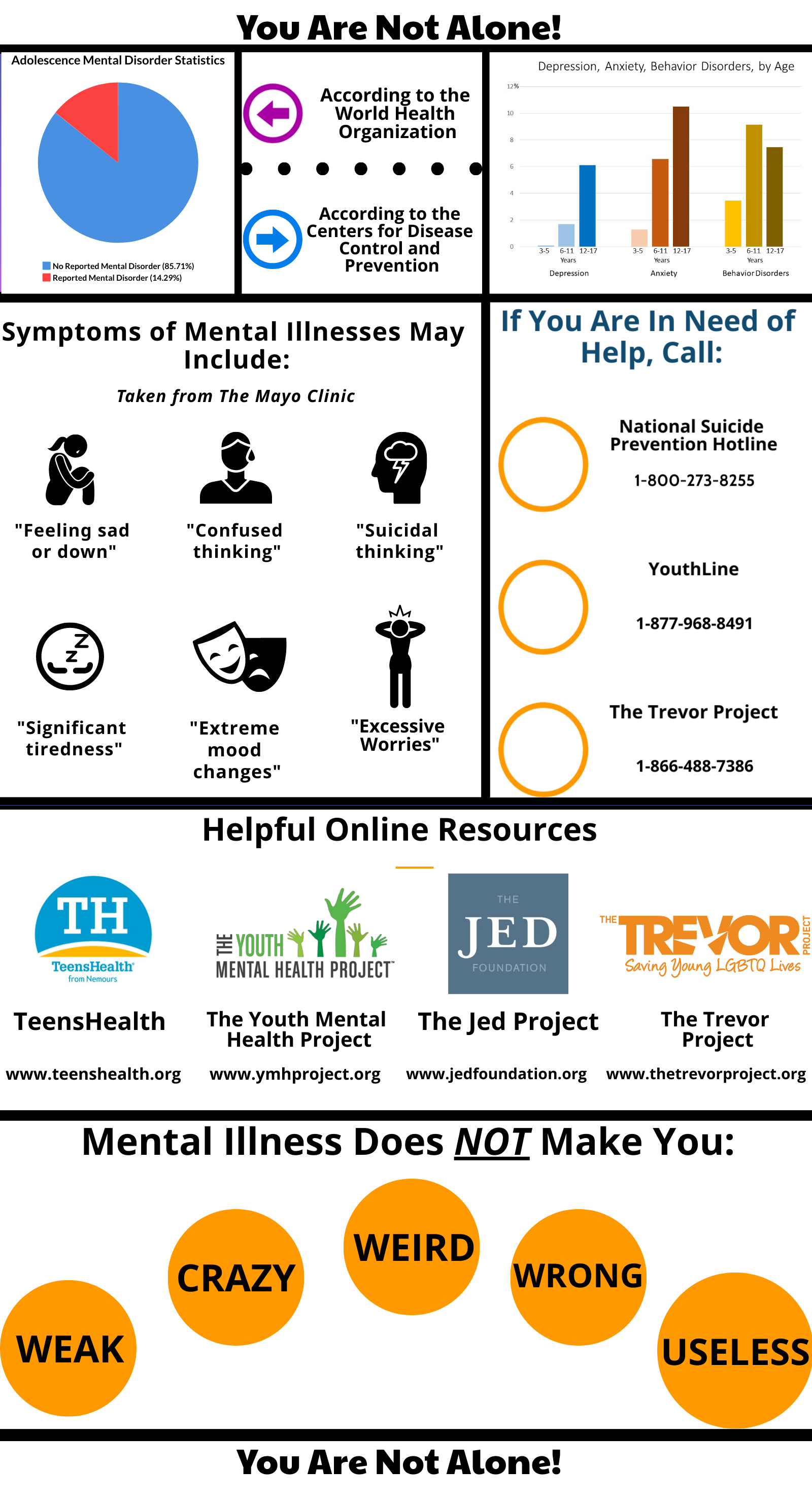Mental Health and Modern Youth - by Kaylee McClure
- Page ID
- 187941
\( \newcommand{\vecs}[1]{\overset { \scriptstyle \rightharpoonup} {\mathbf{#1}} } \)
\( \newcommand{\vecd}[1]{\overset{-\!-\!\rightharpoonup}{\vphantom{a}\smash {#1}}} \)
\( \newcommand{\id}{\mathrm{id}}\) \( \newcommand{\Span}{\mathrm{span}}\)
( \newcommand{\kernel}{\mathrm{null}\,}\) \( \newcommand{\range}{\mathrm{range}\,}\)
\( \newcommand{\RealPart}{\mathrm{Re}}\) \( \newcommand{\ImaginaryPart}{\mathrm{Im}}\)
\( \newcommand{\Argument}{\mathrm{Arg}}\) \( \newcommand{\norm}[1]{\| #1 \|}\)
\( \newcommand{\inner}[2]{\langle #1, #2 \rangle}\)
\( \newcommand{\Span}{\mathrm{span}}\)
\( \newcommand{\id}{\mathrm{id}}\)
\( \newcommand{\Span}{\mathrm{span}}\)
\( \newcommand{\kernel}{\mathrm{null}\,}\)
\( \newcommand{\range}{\mathrm{range}\,}\)
\( \newcommand{\RealPart}{\mathrm{Re}}\)
\( \newcommand{\ImaginaryPart}{\mathrm{Im}}\)
\( \newcommand{\Argument}{\mathrm{Arg}}\)
\( \newcommand{\norm}[1]{\| #1 \|}\)
\( \newcommand{\inner}[2]{\langle #1, #2 \rangle}\)
\( \newcommand{\Span}{\mathrm{span}}\) \( \newcommand{\AA}{\unicode[.8,0]{x212B}}\)
\( \newcommand{\vectorA}[1]{\vec{#1}} % arrow\)
\( \newcommand{\vectorAt}[1]{\vec{\text{#1}}} % arrow\)
\( \newcommand{\vectorB}[1]{\overset { \scriptstyle \rightharpoonup} {\mathbf{#1}} } \)
\( \newcommand{\vectorC}[1]{\textbf{#1}} \)
\( \newcommand{\vectorD}[1]{\overrightarrow{#1}} \)
\( \newcommand{\vectorDt}[1]{\overrightarrow{\text{#1}}} \)
\( \newcommand{\vectE}[1]{\overset{-\!-\!\rightharpoonup}{\vphantom{a}\smash{\mathbf {#1}}}} \)
\( \newcommand{\vecs}[1]{\overset { \scriptstyle \rightharpoonup} {\mathbf{#1}} } \)
\( \newcommand{\vecd}[1]{\overset{-\!-\!\rightharpoonup}{\vphantom{a}\smash {#1}}} \)
\(\newcommand{\avec}{\mathbf a}\) \(\newcommand{\bvec}{\mathbf b}\) \(\newcommand{\cvec}{\mathbf c}\) \(\newcommand{\dvec}{\mathbf d}\) \(\newcommand{\dtil}{\widetilde{\mathbf d}}\) \(\newcommand{\evec}{\mathbf e}\) \(\newcommand{\fvec}{\mathbf f}\) \(\newcommand{\nvec}{\mathbf n}\) \(\newcommand{\pvec}{\mathbf p}\) \(\newcommand{\qvec}{\mathbf q}\) \(\newcommand{\svec}{\mathbf s}\) \(\newcommand{\tvec}{\mathbf t}\) \(\newcommand{\uvec}{\mathbf u}\) \(\newcommand{\vvec}{\mathbf v}\) \(\newcommand{\wvec}{\mathbf w}\) \(\newcommand{\xvec}{\mathbf x}\) \(\newcommand{\yvec}{\mathbf y}\) \(\newcommand{\zvec}{\mathbf z}\) \(\newcommand{\rvec}{\mathbf r}\) \(\newcommand{\mvec}{\mathbf m}\) \(\newcommand{\zerovec}{\mathbf 0}\) \(\newcommand{\onevec}{\mathbf 1}\) \(\newcommand{\real}{\mathbb R}\) \(\newcommand{\twovec}[2]{\left[\begin{array}{r}#1 \\ #2 \end{array}\right]}\) \(\newcommand{\ctwovec}[2]{\left[\begin{array}{c}#1 \\ #2 \end{array}\right]}\) \(\newcommand{\threevec}[3]{\left[\begin{array}{r}#1 \\ #2 \\ #3 \end{array}\right]}\) \(\newcommand{\cthreevec}[3]{\left[\begin{array}{c}#1 \\ #2 \\ #3 \end{array}\right]}\) \(\newcommand{\fourvec}[4]{\left[\begin{array}{r}#1 \\ #2 \\ #3 \\ #4 \end{array}\right]}\) \(\newcommand{\cfourvec}[4]{\left[\begin{array}{c}#1 \\ #2 \\ #3 \\ #4 \end{array}\right]}\) \(\newcommand{\fivevec}[5]{\left[\begin{array}{r}#1 \\ #2 \\ #3 \\ #4 \\ #5 \\ \end{array}\right]}\) \(\newcommand{\cfivevec}[5]{\left[\begin{array}{c}#1 \\ #2 \\ #3 \\ #4 \\ #5 \\ \end{array}\right]}\) \(\newcommand{\mattwo}[4]{\left[\begin{array}{rr}#1 \amp #2 \\ #3 \amp #4 \\ \end{array}\right]}\) \(\newcommand{\laspan}[1]{\text{Span}\{#1\}}\) \(\newcommand{\bcal}{\cal B}\) \(\newcommand{\ccal}{\cal C}\) \(\newcommand{\scal}{\cal S}\) \(\newcommand{\wcal}{\cal W}\) \(\newcommand{\ecal}{\cal E}\) \(\newcommand{\coords}[2]{\left\{#1\right\}_{#2}}\) \(\newcommand{\gray}[1]{\color{gray}{#1}}\) \(\newcommand{\lgray}[1]{\color{lightgray}{#1}}\) \(\newcommand{\rank}{\operatorname{rank}}\) \(\newcommand{\row}{\text{Row}}\) \(\newcommand{\col}{\text{Col}}\) \(\renewcommand{\row}{\text{Row}}\) \(\newcommand{\nul}{\text{Nul}}\) \(\newcommand{\var}{\text{Var}}\) \(\newcommand{\corr}{\text{corr}}\) \(\newcommand{\len}[1]{\left|#1\right|}\) \(\newcommand{\bbar}{\overline{\bvec}}\) \(\newcommand{\bhat}{\widehat{\bvec}}\) \(\newcommand{\bperp}{\bvec^\perp}\) \(\newcommand{\xhat}{\widehat{\xvec}}\) \(\newcommand{\vhat}{\widehat{\vvec}}\) \(\newcommand{\uhat}{\widehat{\uvec}}\) \(\newcommand{\what}{\widehat{\wvec}}\) \(\newcommand{\Sighat}{\widehat{\Sigma}}\) \(\newcommand{\lt}{<}\) \(\newcommand{\gt}{>}\) \(\newcommand{\amp}{&}\) \(\definecolor{fillinmathshade}{gray}{0.9}\)The process of growing up is brimming with twists, turns, bumps, highs, and lows. Throughout your journey from adolescence to young adulthood, it’s only natural to feel overwhelmed with stress and intimidation. Although you might feel isolated and filled with doubt, it’s critical to understand that YOU ARE NOT GOING THIS ALONE!
The National Alliance on Mental Illness estimates that “16.5% of U.S. youth aged 6-17 experienced a mental health disorder in 2016 (7.7 million people)” (“Mental Health by the Numbers”), while a 2021 World Health Organization article states the following. “Globally, it is estimated that 1 in 7 (14%) 10-19 year-olds experience mental health conditions” (“Adolescent Mental Health”). Factors such as your developing brain, the increasing difficulty of schoolwork, and the prevalence of social media are the most common sources of stress for young minds. Notable examples include increasing nerves surrounding college acceptance, forming a sense of self-identity, and handling cyberbullying. Regardless of the magnitude or type of issue at hand, it’s critical to reach out for help.
Finding the best help resources for mental health issues can be intimidating but choosing the correct form of help can make a world of difference. Popular options include the following.
- Therapy and Counseling
- In-person and Online Support Groups
- Mental Health Crises Hotlines
- Foundations for Vulnerable Communities
- Psychological and Mental Health Organizations
Remember That You Are Never in This Alone

Works Cited
“Adolescent Mental Health.” Www.who.int, www.who.int/news-room/fact-sheets/detail/adolescent-mental-health#:~:text=Key%20facts%201%20Globally%2C%20one%20in%20seven%2010-19-year-olds.
“Mental Health by the Numbers | NAMI: National Alliance on Mental Illness.” Nami.org, Mar. 2021, nami.org/mhstats.
Image Citations
“Data and Statistics on Children’s Mental Health.” Centers for Disease Control and Prevention, CDC, 3 June 2022, www.cdc.gov/childrensmentalhealth/data.html.
“Donate $100, $250, $500 for Education about Youth Mental Health.” The Youth Mental Health Project, ymhproject.networkforgood.com/projects/19860-5-for-5.
“Macy’s Raises More than $1.7 Million to Help the Trevor Project Expand Its Suicide Prevention and Crisis Intervention Services for LGBTQ Youth.” Macy’s, Inc., 1 July 2021, www.macysinc.com/investors/news-events/press-releases/detail/1690/macys-raises-more-than-1-7-million-to-help-the-trevor.
“The JED Foundation and Mallinckrodt Pharmaceuticals Partner to Provide Safe Drug Disposal Systems to College Campuses.” Www.prnewswire.com, 2 Dec. 2015, www.prnewswire.com/news-releases/the-jed-foundation-and-mallinckrodt-pharmaceuticals-partner-to-provide-safe-drug-disposal-systems-to-college-campuses-300186492.html.
“Websites for Teens | East Grand Forks, MN.” Eastgrandforks.us, eastgrandforks.us/537/Websites-for-Teens.
Bibliography
Caqueo-Urízar, Alejandra, et al. “Children’s Mental Health: Discrepancy between Child Self-Reporting and Parental Reporting.” Behavioral Sciences (2076-328X), vol. 12, no. 10, Oct. 2022, p. N.PAG. EBSCOhost, https://doi.org/10.3390/bs12100401.
“Identifying and Addressing Mental Health Self‐stigma.” Brown University Child & Adolescent Behavior Letter, vol. 37, no. 11, Nov. 2021, pp. 1–4. EBSCOhost, https://doi.org/10.1002/cbl.30581.
Kindall, Johnathan. “Mental Health Resources for Teens.” TeenLife, 22 June 2022, www.teenlife.com/blog/mental-health-resources-for-teens/.
“Mental Health and Wellness Resources.” Www.acf.hhs.gov, 4 Apr. 2020, www.acf.hhs.gov/toolkit/mental-health-and-wellness-resources.
“Mental Health in Schools | NAMI: National Alliance on Mental Illness.” Nami.org, NAMI, 2021, www.nami.org/Advocacy/Policy-Priorities/Improving-Health/Mental-Health-in-Schools.
Semovski, Valbona, et al. “Mental Health Service Urgency in Children’s Mental Health: Factors Impacting the Need for Expedited Services.” Child Psychiatry & Human Development, vol. 53, no. 4, Aug. 2022, pp. 765–75. EBSCOhost, https://doi.org/10.1007/s10578-021-01161-2.
Spiker, Douglas A., and Joseph H. Hammer. “A Model of Intention to Provide Mental Health First Aid in College Students.” Journal of Mental Health, vol. 30, no. 3, June 2021, pp. 276–83. EBSCOhost, https://doi.org/10.1080/09638237.2019.1644493.
Whitney, Daniel G., and Mark D. Peterson. “US National and State-Level Prevalence of Mental Health Disorders and Disparities of Mental Health Care Use in Children.” JAMA Pediatrics, vol. 173, no. 4, 1 Apr. 2019, p. 389, 10.1001/jamapediatrics.2018.5399.
Wissow, Lawrence S et al. “Integrating Children's Mental Health into Primary Care.” Pediatric clinics of North America vol. 63,1 (2016): 97-113. doi:10.1016/j.pcl.2015.08.005

